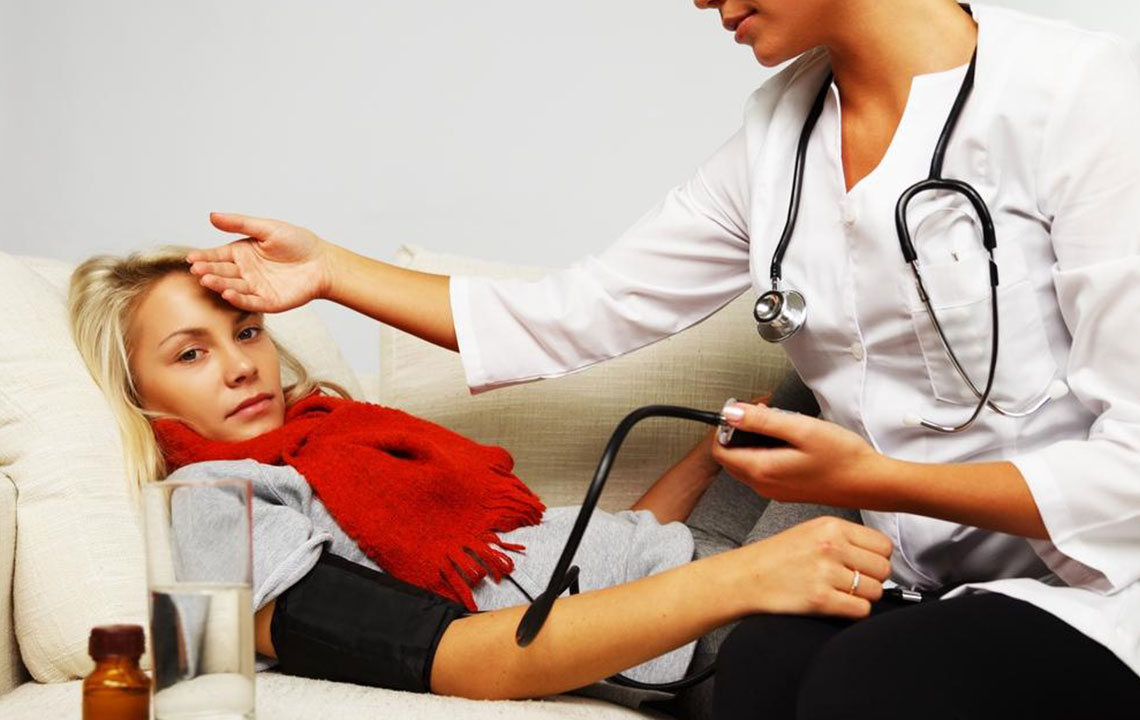Causes, symptoms and Home Remedies for Pneumonia
Pneumonia is an infection that targets one or both the lungs. This infection commonly causes an inflammation of the airspaces in the lungs. The air sacs in the lungs are known as alveoli. The inflamed alveoli get filled with pus and liquid, making it extremely difficult to breathe.
Pneumonia and symptoms of pneumonia are caused by bacteria, viruses, and fungi that lead to the formation of an infection.

This fatal disease can affect anybody, irrespective of their age or gender. However, elderly people and individuals who have a weak immune system are at a greater risk of suffering from this condition. It is more serious and difficult to treat when contracted by younger kids, old individuals, and people who already suffer from a medical condition.
The condition and symptoms of pneumonia generally begin when one inhales a bad germ into the lungs. A person who is suffering from cold or fever is likely to get the disease as these infectious conditions make it difficult for the lungs to restrain and fight against the germs. Also, people who have chronic illnesses like diabetes or cancer may have a higher risk.
Pneumonia is contagious and can spread through inhalation of droplets from the sneeze or cough of an affected person. However, there are some types of pneumonia that are not contagious and do not spread through contact or being around a patient.
Symptoms of pneumonia can be easily noticeable and come quickly after the lungs are infected. The symptoms also differ on the basis of age and the type of pneumonia. Most commonly, the symptoms experienced include heavy coughing that produces mucus or phlegm. This is followed by pain in the chest, falling short of breath, and high fever with sweating. Symptoms of pneumonia in a child will include lack of energy and inability to consume foods or liquids. Moreover, older people will have few number of symptoms. They do have a cough but one that does not produce mucus. One may also suffer from confusion and the tendency to forget.
When pneumonia is diagnosed, it is treated with antibiotics as it can effectively cure bacteria. During the period of treatment, one must get enough rest and eat a healthy diet. The following home remedies, when coupled with medical attention that can aid in the quick treatment of this respiratory infection:
Fenugreek – Fenugreek is an ingredient that is popularly used in cooking. It also has a great effect in treating pneumonia by removing the toxins in the body through sweat or perspiration. Fenugreek should be boiled in a glass of water, cooled and strained before the concoction is consumed.
Garlic – Garlic is a super root and comes with antibacterial properties that help fight against bacteria and viruses. It also helps in clearing the chest and lungs of mucus and other congestions. Garlic can be crushed or grated and added to lemon juice and honey, this mixture should be consumed at least 2 to 3 times a day.
Mix vegetable juice – Fresh juice that is extracted from a mix of vegetables such as beet root, spinach, cucumber, carrots, etc., are great not only for the overall health of the body but also the treatment of pneumonia. The vegetable juice flushes out toxins from the body and boosts immunity that fights off diseases. All the vegetables should be added in equal proportion and the juice should be preferably consumed every day in the morning.
Inhaling of steam – Steam is inhaled to clear the congestion in the chest and lungs. It brings good comfort to the body also helps in easy breathing that is affected by pneumonia. A few drops of essential oil can be added to steaming water; however, this is an option and inhaling only steam too will play the trick.
Turmeric – Turmeric is an herb that is very well-renowned for its medicinal properties. It also has an exceptional effect in treating pneumonia as it comes with antifungal and antiseptic properties too. One should add a teaspoon of turmeric to a glass of warm milk and consume every day before going to bed.
Pleurisy root – The pleurisy root helps in reducing the inflammation in the lungs. A powder should be ground and added to a cup of warm water. This tea should be sipped on throughout the day. However, this herb should not be consumed in excess as it can cause stomach ache and other heart irregularities.
One should strive and prevent the symptoms of pneumonia by washing their hands often and keeping away from people who already have the flu or any viral infection. Getting a vaccine, especially for young kids, is important as it prevents the risk of contracting the disease.











